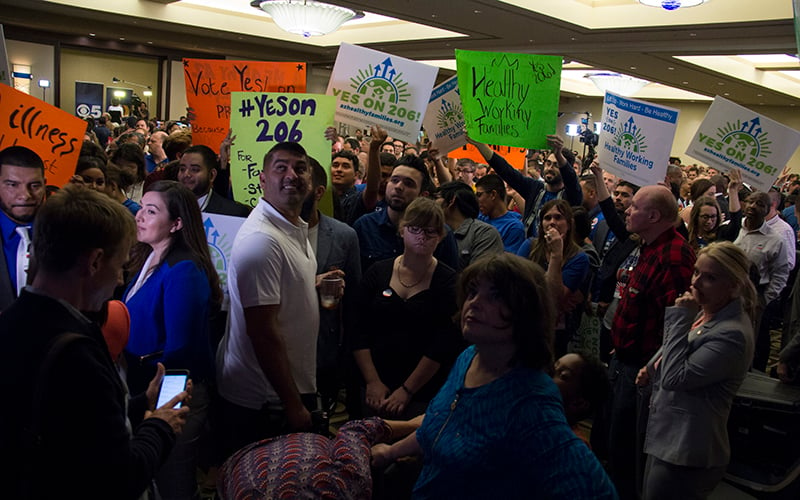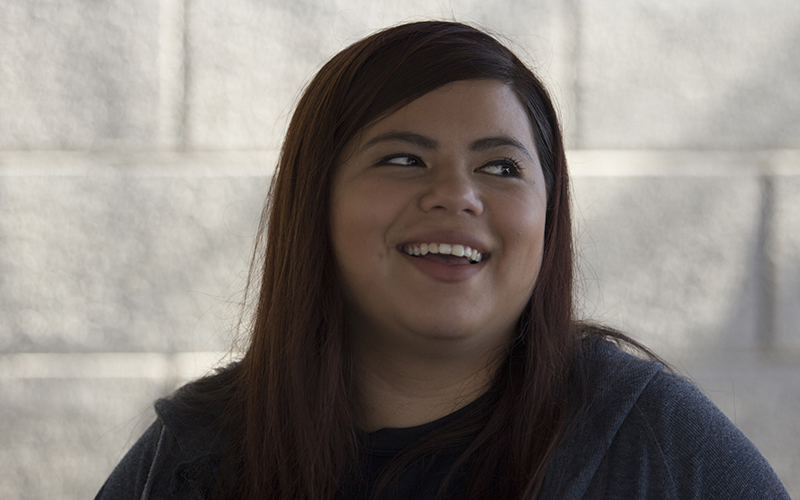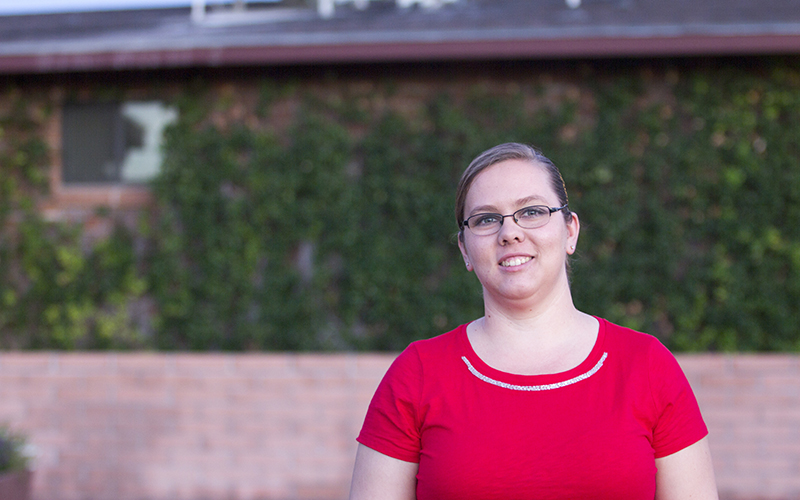
Supporters of Proposition 206, a measure to raise the minimum wage, cheer as early results come in Tuesday night. (Photo by Ally Carr/Cronkite News)
PHOENIX – Supporters of Proposition 206, the measure to raise the minimum wage, gathered alongside a crowd of about 300 gathered at the Renaissance Phoenix Downtown Hotel on Tuesday night and cheered as early election results appeared on the screen.
The measure, which will gradually raise the state’s minimum wage and require businesses to offer paid sick time, had a healthy lead as early results were released. The Associated Press called the race early in the evening.
“To be honest, it’s something that I believe that (regardless) of what side you’re on, we all know that it’s time,” said Stephanie Vasquez, owner of Fair Trade Cafe and proponent of the measure. “So it’s not surprising, it’s exciting.”
Known as the “Fair Wages and Healthy Families act,” the measure will raise minimum wage to $12 hour by 2020 – a 50 percent increase in four years. Arizona’s current minimum wage is $8.05 an hour.
Proponents of Prop. 206, which include Phoenix Mayor Greg Stanton and Protecting Arizona’s Family Coalition, say the measure is good for working families because every worker deserves to earn a living wage. Supporters also say earned sick days are important for public health so that people don’t go to work sick just so they don’t miss hours.
Opponents to the measure, which include the Arizona Small Business Association and the Arizona Restaurant Association, say that a higher minimum wage will lead to businesses cutting employees hours, replacing workers with automation or raising prices. Several area chamber of commerce representatives said they worry some small businesses can’t afford a 50 percent increase in wages and might go out of business.
Boaz Witbeck, policy director for Americans for prosperity, a nonprofit organization, said he was disappointed as officials released the early results.
“There are still a lot of ballots to be counted,” he said. “If this does pass, that is definitely going to be hurtful for younger workers, people with less skill … and small businesses”
An October poll showed that a strong majority of Arizona voters support Prop. 206. About 58 percent of the 779 registered voters polled said they favored the measure, about 32 percent opposed it and 10 percent were undecided, according to the Arizona Republic/Morrison/Cronkite News poll.
Cindy Bernal, 20, started working for minimum wage at Church’s Chicken two years ago to help her mother pay bills and provide for the family of four. Although she now makes slightly more than minimum wage, she said $8.50 isn’t enough to live on.

Cindy Bernal, 20, a Phoenix resident, said that people can’t live on the minimum wage. She said she voted for Proposition 206. (Photo by Ally Carr/Cronkite News)
“It’s been hard because, even though I put in a lot of hours, it still isn’t enough,” said Bernal, a Phoenix resident who said she voted for Prop. 206. “They say it’s going to be a bad thing because everything is going to go up, but people have to understand that we can’t live on minimum wage.”
Bernal works about 60 hours a week at two jobs to help out while her younger brother and sister make it through school. “It’s been hard on us, but we manage,” she said.
She doesn’t plan on working there forever, however. In January, she will start classes at the University of Phoenix to learn forensics.
Lily Winchester, 29, makes minimum wage working for TMM Family Services Inc. in its group home in Tucson that serves kids removed from their homes by the Arizona Department of Child Safety. She plans to vote no on Prop. 206.
“I am not in favor, and I know that probably sounds really stupid to people who are like, ‘well, you get a raise in pay,'” she said. She stays overnight to take care of four to six kids, helping them if they have a bad dream, get sick or wet the bed. On good nights, she gets paid $8.05 an hour to sleep.
A higher minimum wage is an unearned raise that has a higher cost to businesses, she said.

Lily Winchester of Tucson earns minimum wage, but she does not support Proposition 206. (Photo by Ally Carr/Cronkite News)
“Communities are built on small businesses, and when you force small businesses to pay more and more money, they’re not going to have the money they need to grow. It may even cause them to shut their doors,” she said.
Winchester said she understands why people would want to raise the minimum wage, but she also believes that people who want a better job that offers higher pay and benefits should get training or certification to earn that higher pay.
“I know a lot of people think that the American dream has died, but the American dream wasn’t about being rich, it was about hard work and being successful in the way that you consider what successful was,” she said. “You’ve got to work hard. It’s a lot of pain and trial along the way, but once you get there, you’re there.”
If the measure passes, Arizona’s minimum wage will raise from $8.05 per hour to $10 per hour on Jan. 1, 2017, then gradually to $12 by 2020. After 2020, the minimum wage would be adjusted for cost of living.
The measure would ensure workers earn one hour of paid sick time for every 30 hours worked, up to 40 hours of paid sick time a year to employees of businesses with more than 15 employees, and 24 hours for businesses with fewer than 15 employees.
The measure also gives counties, cities and towns the authority to regulate their minimum wage and benefits by ordinance.